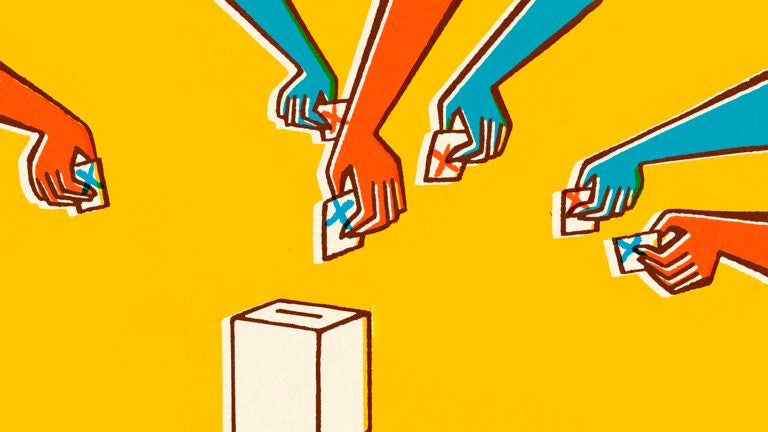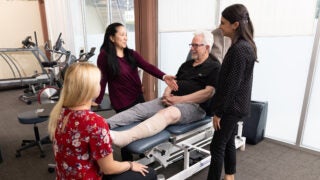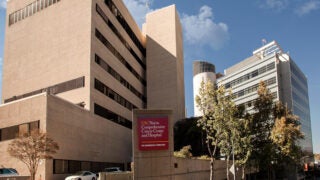
Californians vote on Super Tuesday this year. (Illustration/iStock)
Will Super Tuesday make or break presidential candidates?
USC experts examine the unique aspects of today’s vote — including the fact that, for once, California matters.
Voters in 14 states will cast votes for presidential candidates on March 3, also known as Super Tuesday. With President Donald Trump all but guaranteed the Republican party nomination, the outcome of Super Tuesday is critical to determining which of the remaining Democratic candidates will face the president in the November general election. More than a third of all delegates for the Democratic National Convention will be allotted in primary contests in states including Texas, Virginia, Massachusetts and Super Tuesday newcomer California.
Now is when things get serious in the presidential race.
Christina Bellantoni
The days leading up to Super Tuesday have been full of twists and turns. Soon after announcing they were suspending their campaigns, former South Bend, Indiana Mayor Pete Buttigieg and Minnesota Sen. Amy Klobuchar promptly threw their support to former Vice President Joe Biden. Biden received those endorsements while basking in the glow of his recent landslide victory in the South Carolina primary, a much-needed resurgence after lagging behind Vermont Sen. Bernie Sanders in Iowa, New Hampshire and Nevada.
“Now is when things get serious in the presidential race,” said Christina Bellantoni, director of the Annenberg Media Center and a professor at the USC Annenberg School for Communication and Journalism, which will host a Super Tuesday viewing party complete with an expert panel to analyze the returns.
“Super Tuesday has never been more critical,” agreed Michael Murphy, co-director of the USC Dornsife Center for the Political Future and a political consultant who has worked on six Republican presidential campaigns. “It will decide if Bernie Sanders can jump to a very strong delegate lead or if a more centrist challenger can emerge as a possible alternative.”
“If Joe Biden recovers and becomes the Bernie alternative, it will be a political miracle unlike most events we’ve ever seen in presidential primary politics,” said Robert Shrum, director of the Center for the Political Future at the USC Dornsife College of Letters, Arts and Sciences and a longtime Democratic political strategist.
It could all come down to Super Tuesday, and California is playing an outsized role.
All eyes on California on this Super Tuesday
The Golden State is making its Super Tuesday debut, having moved up its primary date from June in a bid for greater relevance. In presidential primaries past, candidates have famously used California as an ATM to fund their primary campaigns without spending quality time courting voters at rallies, town halls, places of worship and beloved local restaurants. No more.
California is the country’s most populous state and will contribute 415 (roughly one-third) of Super Tuesday’s 1,357 total delegates.
“Here’s a fun fact,” said Bellantoni. “The first three early states – Iowa, New Hampshire, Nevada – have a smaller combined population than Los Angeles County.”
Bellantoni said the state’s earlier than usual primary is an important test for the candidates: “Can he or she appeal to the masses? How about to minority voters? What about to voters who lean more liberal on economic and social policy?”
“Commentators see California as the big prize on Super Tuesday,” said Shrum. But he pointed out that most delegates are allocated by congressional district and it may take weeks to know who won them. “The contest will have moved on and all we will probably have election night is an exit poll.”
A big deciding factor in racially and ethnically diverse California is who turns out to vote.
We’ll see more voters come out that typically don’t vote in a primary, but it will still be far from representative.
Mindy Romero
“We’ll see more voters come out that typically don’t vote in a primary, but it will still be far from representative,” said Mindy Romero, director of the California Civic Engagement Project at the USC Price School of Public Policy, which recently released an analysis that showed California Latinos and Asian Americans could make up 30% of primary voters if their 2016 turnout rate holds steady.
“Even in a high-turnout general election we know that we’re going to have lower turnout from historically underrepresented groups: lower turnout among Latinos and Asian Americans versus whites; lower turnout among younger voters than older voters; low income versus higher income,” said Romero. “And those disparities in turnout translate over into a pie of voters in an election that doesn’t look like the rest of the state.”
Complicating things for California voters on this Super Tuesday are new voting procedures, including updated voting technology, extended early in-person voting, and the elimination of thousands of polling places. A recent USC Price School and USC Schwarzenegger Institute California Issues Poll found that only about one-third of likely voters knew about these vote changes.
Christian Grose, an associate professor of political science and public policy and academic director of the USC Schwarzenegger Institute, said one of the most interesting findings was that California voters were more knowledgeable about the new voting procedures depending on which candidate they supported. In counties with voting changes, only 28.8% of Sanders supporters knew that voting had changed. Among supporters of Sen. Elizabeth Warren, 40.8% knew voting had changed. And among Biden supporters, 51.7% knew it had changed.
“This could mean that Sanders supporters will be more confused about how and where to vote, perhaps meaning many of those votes will come in later as California slowly counts its ballots,” he explained.
California on Super Tuesday: The cautionary tale of 2016
While many voters depend on the news media to help them understand rapidly evolving election dynamics – including who has the best chance of emerging victorious on Super Tuesday – reporters are still coming to terms with the surprise outcome of the 2016 presential election, said Ernest J. Wilson III, professor of communication and political science and former USC Annenberg dean.
Journalists, pollsters, pundits — everybody’s been burned, because nobody was predicting that Trump would win in 2016.
Ernest J. Wilson III
“There’s still the pressure to be first-and-furious regarding the results of the primaries and caucuses, and you also see confusion about how to balance coverage of personalities versus substantive policy issues,” said Wilson. “Journalists, pollsters, pundits — everybody’s been burned, because nobody was predicting that Trump would win in 2016, so now they’re all being a bit shy about drawing conclusions from the usual criteria.”
Whatever the outcome, USC scholars agree that Super Tuesday is the most important test yet for the shrinking pool of Democratic presidential candidates.
“The stakes could not be higher,” said Murphy.


